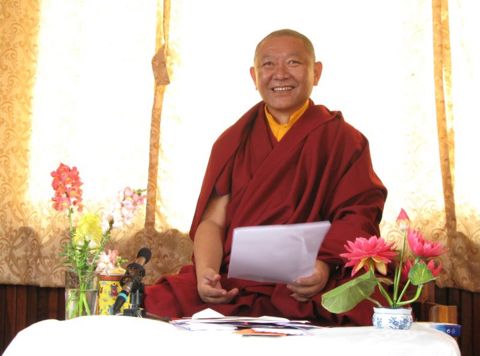Ringu Tulku Rinpoche 2008 teaching MP3: Difference between revisions
Jump to navigation
Jump to search
m (→[[Madhyamika]]) |
mNo edit summary |
||
| (3 intermediate revisions by 3 users not shown) | |||
| Line 1: | Line 1: | ||
==Questions to Ringu Tulku Rinpoche during his visit in [[Pharping]] on 5-March-2008== | ==Questions to [[Ringu Tulku Rinpoche]] during his visit in [[Pharping]] on 5-March-2008== | ||
'''Download the entire teaching as [http://www.rigpawiki.org/Media/Audio/20080305PH1000RT.mp3 MP3]''' | '''Download the entire teaching as [http://www.rigpawiki.org/Media/Audio/20080305PH1000RT.mp3 MP3]''' | ||
| Line 51: | Line 51: | ||
* How the [[skilful means]] of the [[Vajrayana]] are based on the [[two truths]]? [01:58] | * How the [[skilful means]] of the [[Vajrayana]] are based on the [[two truths]]? [01:58] | ||
* We had very good psychologists and philosophers in the west in the | * We had very good psychologists and philosophers in the west in the 19th century (at the time [[Mipham Rinpoche]] lived), such as Freud and Nietzsche. They had many good ideas, but at the same time they had many mistakes as well. Part of our tradition is to refute part of the works of previous thinkers. On the other hand, should we consider Mipham Rinpoche's words as perfect? Should we accept them as they are? [02:01] | ||
[[Category: MP3 Library]] | |||
[[Category:Shedra East 2008]] | |||
[[Category:Rigpa Shedra]] | |||
Latest revision as of 19:06, 13 July 2010
Questions to Ringu Tulku Rinpoche during his visit in Pharping on 5-March-2008
Download the entire teaching as MP3
The questions asked to Ringu Tulku Rinpoche are listed below. The recording-time in brackets after each question can be used as a help to quickly access a specific questions.
Most of the questions relate to the four schools or four tenet systems.

General Questions
- I am new to the Dharma, and I would like to know why it is important to have a master. [00:01]
- Do you have a story which can help us see how study, reflection and meditation can remove doubts of the nature of reality for good? [00:14]
- How do I know I have Buddha nature? (I know the sun is above the clouds, how do I know I have Buddha nature?) [00:28]
- It seems that there is an underlying assumption to all Pramana investigation, namely that nature behaves uniformly. How is it correct to describe inference as a valid proof when it is based on this assumption of the uniformity of nature? [00:34]
- Can you explain the connection between mind and matter? [00:45]
- How can we determine that something is sentient (e.g. an animal, a tree, a robot...) [00:58]
Vaibhashika and Sautrantika
- The Vaibhashika and Sautrantika view of their absolute truth are presented as the same. On the other hand we are told that the Sautantrika view is superior to that of the Vaibhashika. Doesn't that imply that their understanding of the absolute is more refined? [01:03]
Chittamatra
- How would you explain to a general Buddhist public (with small philosophical Buddhist background) the system of the Chittamatra? How can you help them understand a given object perceived is mind only? [01:09]ths
- It seems to be quite a mental leap to understand that mind can only cognize something of the same nature as itself, that there needs to be a relationship of same nature between mind and its object. How can we begin to understand this? [01:21]
- If there are many distinct mindstreams, how come that we so coherently see the world in the same way? Do we share seeds of karma, because otherwise it seems difficult to explain such coherency? [01:24]
- Although we speak of the two truths, isn't it more accurate to say that there is just a single insight into the nature of things (Dharmata, chos nyid or suchness), not "the union of the two" and so on, which is discursive but just one insight. Are the two truths a sort of provisional teaching pointing to the one truth “suchness”, one taste? [01:31]
Madhyamika
- All schools of Madhyamika have the same view of the absolute, but they differ in their view of the relative truth. How can one combine the Sautrantika view of the relative with the Madhyamika? [01:37]
- The relative said to be “the way things appear”. Does that mean that they are wrong even before we think about it, at the level of direct perception? [01:41]
- How do Gelugpa understand true existence as something separate from phenomenona? (eg. The cup is not empty, the true existence is empty. How can I understand how the cup exist and how the lack of inherent existence is something separate from the cup?). [01:47]
- How reasoning can help overcome innate grasping? [01:50]
- What is the difference in the use of logical between the Svatantrika and the Prasangika? [01:56]
- How the skilful means of the Vajrayana are based on the two truths? [01:58]
- We had very good psychologists and philosophers in the west in the 19th century (at the time Mipham Rinpoche lived), such as Freud and Nietzsche. They had many good ideas, but at the same time they had many mistakes as well. Part of our tradition is to refute part of the works of previous thinkers. On the other hand, should we consider Mipham Rinpoche's words as perfect? Should we accept them as they are? [02:01]